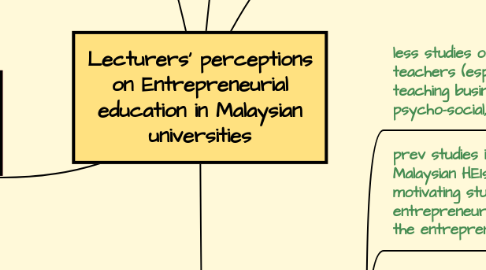
1. Why important to know lecturers' perception?
1.1. To know why lecturers still practice traditional teaching approach despite the urge to incorporate more entrepreneurial approach
1.2. important as this is the basis for further studies; the possible support needed to help the lecturers, the effectiveness of EE across disciplines,
1.3. Lecturers are the important source for change to happen, if they don't understand EE, how can they play their role?
1.4. this also possibly justify why prev studies only focus on students entrepreneurial inclination, because we lack focus on developing the entrepreneurial competence, why? because we don't look at how lecturers from other disciplines can also contribute to the success of EE.
2. Research design
2.1. Quantitative
2.1.1. RQ1, RQ2, & RQ3; Survey
2.1.1.1. Sample; language lecturers from HEIs in Malaysia; N=100
2.1.1.1.1. Communication; oral and written are considered as one of entrepreneurial competencies
2.1.1.1.2. Malaysian graduate are still having poor command of English
2.1.2. RQ4; Pre & Post survey on students
2.1.2.1. To see if there are any changes in teaching approach
2.2. Qualitative
2.2.1. Verifying RQ1, RQ2, RQ3= Interview
2.2.1.1. selected language lecturers from HEIs in Malaysia; N=6
3. Problems
3.1. less studies on the implication of EE on teachers (esp those who are not teaching business or entrepreneurship); psycho-social, perceptions, and readiness
3.2. prev studies indicate that EE in Malaysian HEIs focuses more on motivating studs to become entrepreneurs, how about developing the entrepreneurial competency?
3.3. Studies found lecturers remain using traditional deductive approach; did not reflect EE being practiced. Do they really understand what EE is?
3.3.1. What are lecturers' (nonbusiness) perceptions on EE?
3.3.1.1. What do they understand about EE?
3.3.1.1.1. How do they interpret EE?
3.3.1.1.2. The characteristics of ?
3.3.1.1.3. What have they done to understand EE better?
3.3.1.2. Their evaluation of the 'desirability' of EE?
3.3.1.2.1. What do they think EE is for?
3.3.1.2.2. Why do they think gov enforce EE in HEI?
3.3.1.2.3. Can EE develop entrepreneurial competency among stud?
3.3.1.2.4. What is the best way they think to teach their subject matter?
3.3.1.3. Their evaluation of the 'feasibility' of EE?
3.3.1.3.1. How EE should be conducted?
3.3.1.3.2. Who should conduct/deliver EE?
3.3.1.3.3. Do they think they can approach EE in their teaching? What is their own conception of their skills in EE?
3.3.1.3.4. Do they think EE is culturally accepted?
3.3.1.4. How does lecturers' perception influence their teaching practice?
3.3.1.4.1. Their teaching objective
3.3.1.4.2. their role in the class
3.3.1.4.3. Teaching approach
3.3.1.4.4. Motivation to incorporate EE
4. What is entrepreneurial education (EE)?
4.1. entrepreneurship ed vs enterprise ed
4.1.1. focus of study is on enterprise ed- entrepreneurial ed to develop entrepreneurial competency
4.1.1.1. characteristics of enterprise ed/ education through entrepreneurship
4.2. education about, for, and through entrepreneurship
4.2.1. Context of study; Education through entrepreneurship
4.3. EE in other countries.
4.4. Why need EE?
5. EE in Malaysian universities
5.1. early 1990's focus on motivating entrepreneurial intention
5.1.1. taught to business studs from business schools
5.2. recently EE becomes the national educational agenda
5.2.1. Government urges uni. to incorporate entrepreneurial ed.
5.2.1.1. HEIs Development of Entrepreneurship policy was introduced in 2010.
5.2.1.2. many uni started to approach EE
5.2.1.2.1. provide entre. environment
5.2.1.2.2. increase entre. courses
5.2.1.2.3. EE across curriculum; through elective courses
5.2.1.2.4. staff development trainings
5.2.1.2.5. commercializing research

